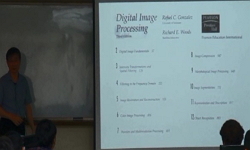The goal of this research is to develop algorithms which generate high quality image for high-performance camera system. The proposed methods remove the unintentional camera motion in the input image, and enhance the contrast while preserving the deta...
http://chineseinput.net/에서 pinyin(병음)방식으로 중국어를 변환할 수 있습니다.
변환된 중국어를 복사하여 사용하시면 됩니다.
- 中文 을 입력하시려면 zhongwen을 입력하시고 space를누르시면됩니다.
- 北京 을 입력하시려면 beijing을 입력하시고 space를 누르시면 됩니다.
Image stabilization and detail-preserving contrast enhancement for high-performance camera system
한글로보기https://www.riss.kr/link?id=T12520216
- 저자
-
발행사항
Seoul : Graduate School, Korea University, 2011
-
학위논문사항
學位論文(博士) -- 高麗大學校 大學院 , 메카트로닉스協同科程 , 2011. 8
-
발행연도
2011
-
작성언어
영어
- 주제어
-
발행국(도시)
서울
-
형태사항
ix, 62장 : 삽화, 도표 ; 26 cm
-
일반주기명
지도교수: 高聖濟
참고문헌: 장 56-62 - DOI식별코드
- 소장기관
-
0
상세조회 -
0
다운로드
부가정보
다국어 초록 (Multilingual Abstract)
First, this dissertation introduces a highly precise DIS scheme for a hybrid stabilizing system. The stabilizing system adopts a hybrid method of using both OIS and DIS. In the stabilizing system, OIS prestabilizes the original unstable image using gyro-sensors and the resultant image obtained from OIS is post-stabilized using DIS to remove the residual jitters less than one pixel. The proposed DIS, which is newly designed using CGI, can remove not only translational jitters but also rotational ones simultaneously.
Second, a novel contrast enhancement scheme using DPS is presented in this dissertation. In order to enhance the contrast, the proposed method adopts contrast stretching since the stretching has a low computational complexity and preserves the global contrast of the original. However, the stretching often produces unpleasant images that do not contain clear details by limiting the output dynamic range. To solve this problem, we propose a new contrast stretching method based on GDP that can enhance the local image contrast while preserving the global contrast as well as the image details. The proposed scheme is useful for enhancement of the image which has low contrast such as IR imagery.
Experimental results show that the proposed image enhancement schemes can remove the unintentional camera movement, achieve considerable performance improvement against conventional image enhancement techniques, and outperforms other methods with respect to the visual quality and computational complexity.
The goal of this research is to develop algorithms which generate high quality image for high-performance camera system. The proposed methods remove the unintentional camera motion in the input image, and enhance the contrast while preserving the detailed information of the original image.
First, this dissertation introduces a highly precise DIS scheme for a hybrid stabilizing system. The stabilizing system adopts a hybrid method of using both OIS and DIS. In the stabilizing system, OIS prestabilizes the original unstable image using gyro-sensors and the resultant image obtained from OIS is post-stabilized using DIS to remove the residual jitters less than one pixel. The proposed DIS, which is newly designed using CGI, can remove not only translational jitters but also rotational ones simultaneously.
Second, a novel contrast enhancement scheme using DPS is presented in this dissertation. In order to enhance the contrast, the proposed method adopts contrast stretching since the stretching has a low computational complexity and preserves the global contrast of the original. However, the stretching often produces unpleasant images that do not contain clear details by limiting the output dynamic range. To solve this problem, we propose a new contrast stretching method based on GDP that can enhance the local image contrast while preserving the global contrast as well as the image details. The proposed scheme is useful for enhancement of the image which has low contrast such as IR imagery.
Experimental results show that the proposed image enhancement schemes can remove the unintentional camera movement, achieve considerable performance improvement against conventional image enhancement techniques, and outperforms other methods with respect to the visual quality and computational complexity.
목차 (Table of Contents)
- 1 Introduction 1
- 2 Brief Backgrounds 5
- 2.1 Conventional Digital Image Stabilization Methods . . . . . . 5
- 2.2 Conventional Contrast Enhancement Methods . . . . . . . . . 6
- 3 Image Stabilization Algorithm 9
- 1 Introduction 1
- 2 Brief Backgrounds 5
- 2.1 Conventional Digital Image Stabilization Methods . . . . . . 5
- 2.2 Conventional Contrast Enhancement Methods . . . . . . . . . 6
- 3 Image Stabilization Algorithm 9
- 3.1 Image Stabilizing System . . . . . . . . . . . . . . . . . . . . 9
- 3.1.1 Pre-stabilization with OIS and Fast Motion Compensation
- . . . . . . . . . . . . . . . . . . . . . . . . . . . 10
- 3.1.2 Post-Stabilization using DIS . . . . . . . . . . . . . . . 11
- 3.1.3 Proposed Digital Image Stabilization . . . . . . . . . . 12
- 4 Contrast Enhancement Algorithm 21
- 4.1 Contrast Enhancement Algorithm for IR imagery . . . . . . . 21
- 4.1.1 Contrast Stretching . . . . . . . . . . . . . . . . . . . 23
- iii
- 4.1.2 Proposed Algorithm ; Detail-Preserving Stretching using
- Gradient-Domain Processing . . . . . . . . . . . . 27
- 5 Simulation Results 32
- 5.1 Experimental Results for Proposed DIS . . . . . . . . . . . . 32
- 5.2 Experimental Results for Proposed Contrast Enhancement
- Method . . . . . . . . . . . . . . . . . . . . . . . . . . . . . . 41
- 6 Conclusions 54








